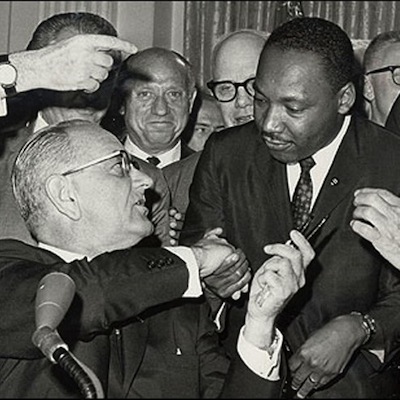Following the Civil War, a group of constitutional amendments worked together to establish the beginning of civil rights in America – the abolishment of slavery (13 Amendment), the citizenship of former slaves (14th Amendment), giving all men the right to vote regardless of race (15th Amendment), and giving women the right to vote (19th amendment).
Nonetheless, many states [particularly in the South] used poll taxes, literacy tests and other measures to keep African-Americans disenfranchised from exercising their right to vote and prospectively deny them citizenship. The enforcement of strict segregation was enacted through Jim Crow laws and condoned violence from white supremacist groups like the Ku Klux Klan.
The U.S. Congress did not take the initiative to make improvements for African-Americans for equality or fair treatment under the law. Finally, in 1957, a Civil Rights Division was established in the Justice Department, along with a Commission on Civil Rights to investigate discriminatory conditions. In 1960, Congress provided for court-appointed referees to help African-Americans register to vote. However, these bills were heavily watered down to overcome southern resistance and gain some momentum in the civil rights movement.
In 1961, John F. Kennedy became the 35th President. He initially delayed supporting new anti-discrimination measures; but with protests springing up throughout the South, Kennedy decided to act. In June 1963, he proposed by far the most comprehensive civil rights legislation to date, saying the United States “will not be fully free until all of its citizens are free.” He was assassinated in November of that year.
The Civil Rights Act of 1964
 This act was signed into law by President Lyndon Johnson on July 2, 1964; it prohibited discrimination in public places, provided for the integration of schools and other public facilities, and made employment discrimination illegal. The Civil Rights Act is a landmark for civil rights and labor law in the United States that outlaws employment discrimination based on race, color, religion, sex, or national origin. This anti-discrimination policy includes during the hiring, promotion and firing of employees. It also prohibits the unequal application of voter registration requirements.
This act was signed into law by President Lyndon Johnson on July 2, 1964; it prohibited discrimination in public places, provided for the integration of schools and other public facilities, and made employment discrimination illegal. The Civil Rights Act is a landmark for civil rights and labor law in the United States that outlaws employment discrimination based on race, color, religion, sex, or national origin. This anti-discrimination policy includes during the hiring, promotion and firing of employees. It also prohibits the unequal application of voter registration requirements.
The Voting Rights Act of 1965
The Summer of 1964 was known as the “Freedom Summer,” where volunteers had worked to register African-American voters in Mississippi. This lead to racial violence, including murder. Following that, in 1965, there were protests and riots over voting rights in Selma, Alabama.
The Voting Rights Act of 1965 is a landmark of federal legislation in the United States that prohibits racial discrimination in voting. It eliminated literacy tests and poll tax requirements, allowed federal examiners to register voters who had been denied their rights, mandated preclearance and tripled the number of African-Americans registered to vote in the South.
The Historical Significance
The importance of both the Civil Rights Act and the Voting Rights Act is that they created enforcement of the previously existing rights under the U.S. Constitution that were not properly granted to African-Americans following the abolishment of slavery. We weren’t always treated equally and it’s shown in history in so many ways. Even when the rights were afforded to us, other laws and regulations were put in place to dismiss our citizenship. The fight doesn’t end when we get equality either. The LGBT community has helped us along the way to gain equal rights (Equal Rights Amendment) and have equal protection under the law enforced. However, the fight continues to establish equity in this country among all citizens.
Thank you for taking the time to read this blog. I always appreciate your support. If you haven’t already, make sure to register to vote and visit the polling booths today to vote for the primaries: Georgia, New York, and everywhere else in the U.S.
